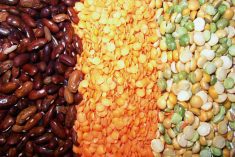CNS Canada — The plunging value of the lira is threatening to curb sales of Canadian lentils to Turkey — traditionally one of Canada’s biggest customers for the pulse.
The Turkish lira hit a record low on Monday as soaring inflation and political turmoil sent the currency plunging relative to the U.S. dollar.
At the start of 2018, one U.S. dollar was equivalent to 3.8 liras, but on Monday it was closer to 7.2.
The crisis has roiled stock markets around the world and raised the spectre of a financial collapse in Turkey.
Read Also

Alberta crop conditions improve: report
Varied precipitation and warm temperatures were generally beneficial for crop development across Alberta during the week ended July 8, according to the latest provincial crop report released July 11.
According to Statistics Canada, over 142,000 tonnes of lentils were exported from Canada in June, which was the largest volume for that particular month in four years. Turkey was one of the month’s biggest buyers, along with Pakistan and Mexico.
According to Pulse Canada CEO Gordon Bacon, that level of Turkish interest comes as no surprise.
“Three years ago, I think they were around C$425 million of lentils, in the highest-volume year,” he said.
The country consumes many pulses annually, but also repackages lentil imports and re-sells them to countries such as Iran, Iraq and Syria.
Bacon noted this relationship could potentially be disrupted if the currency crisis got any worse.
“Will the current trade flow be altered due to credit issues?” he said. “Is there an alternative protein to go to?”
Kazakhstan recently stepped forward as a key supplier of lentils to Turkey, he noted.
If the currency crisis lingers, Bacon said, it will make food more expensive for Turkish consumers and impact a company’s ability to secure financing for imports and exports.
“Finding credit will be tough,” Bacon said.
The situation is also happening at a time when another one of Canada’s largest pulse customers, India, has essentially stepped back from the market.
“Obviously the whole situation does have the attention of the industry. India was a large buyer.”
— Dave Sims writes for Commodity News Service Canada, a Glacier FarmMedia company specializing in grain and commodity market reporting.















